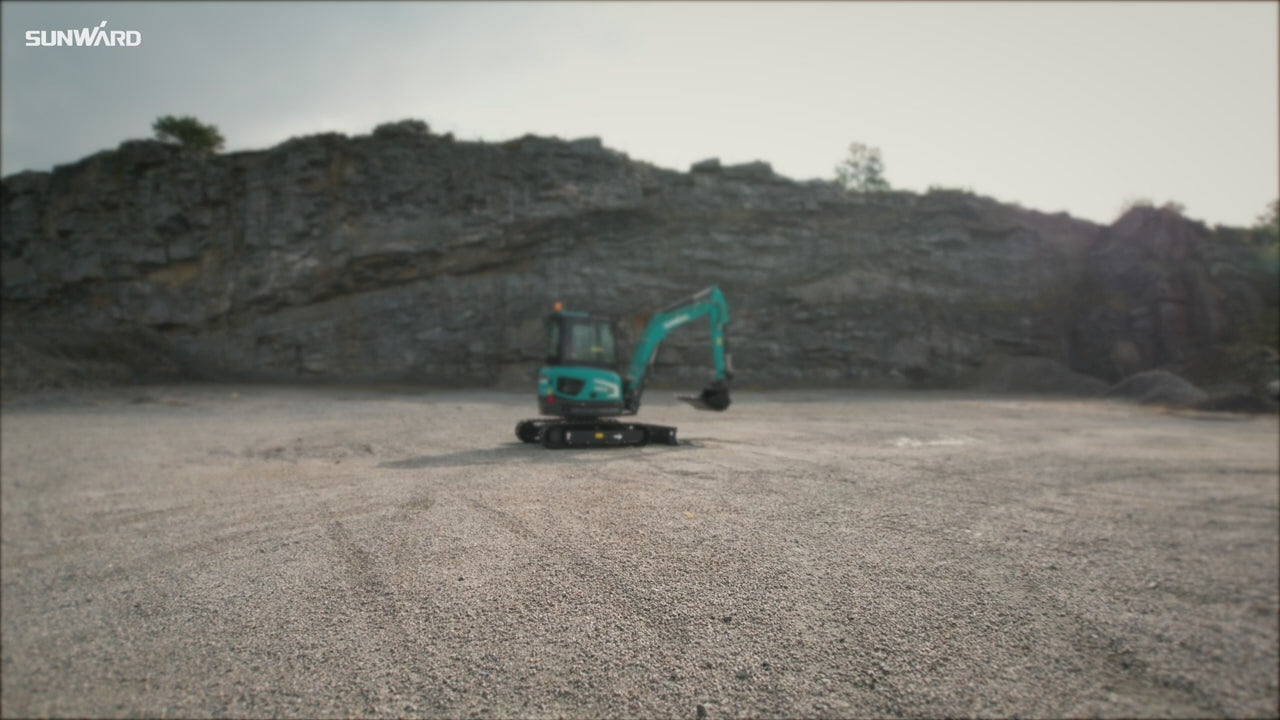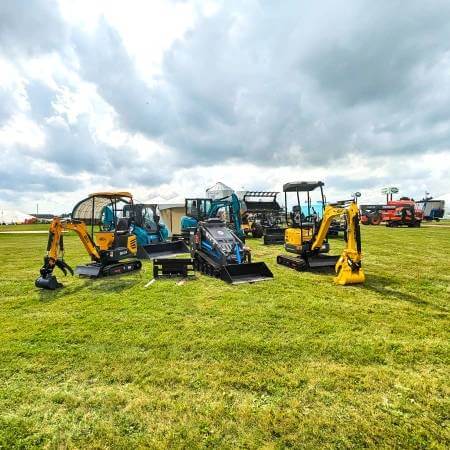Are there any restrictions or permits required for operating mini skid steers in Toronto?
In the bustling construction industry of Toronto, mini skid steers have become invaluable equipment for various projects. However, operating these machines requires contractors to navigate through a myriad of regulations and obtain the necessary permits to ensure compliance with local laws. This article aims to provide a comprehensive guide on understanding and adhering to the regulations for operating mini skid steers in Toronto. While specific data may be subject to change, the information provided will serve as a foundation to assist contractors in their compliance efforts.
Noise Restrictions and Mitigation Measures:
Toronto, being a densely populated urban center, imposes noise regulations to protect the well-being of its residents. Contractors must be aware of the permissible noise levels and time restrictions for operating mini skid steers in different areas of the city. According to the City of Toronto Municipal Code, noise levels from construction equipment, including mini skid steers, should not exceed 85 decibels during the day (7 am to 7 pm) and 50 decibels during the night (7 pm to 7 am) in residential areas. Noise mitigation measures, such as the use of mufflers, soundproof enclosures, or quieter work practices, are essential to ensure compliance with these regulations.
Emission Standards and Environmental Compliance:
Environmental considerations play a significant role in the operation of mini skid steers. Contractors must understand and comply with emission standards set by local environmental agencies. In Toronto, the Ontario Ministry of the Environment, Conservation and Parks sets emission limits for construction equipment, including mini skid steers. As of 2021, the emission limit for nitrogen oxides (NOx) for non-road diesel engines, commonly found in mini skid steers, is 4.0 grams per kilowatt-hour (g/kWh). Contractors should ensure that their mini skid steers meet this emission standard through regular maintenance, engine tune-ups, and the use of emission-certified equipment. Implementing eco-friendly practices not only ensures compliance but also contributes to a cleaner and more sustainable construction environment in Toronto.
Job Site Access and Permits:
Certain construction sites in Toronto may have restricted access due to their locations or specific requirements. Contractors must obtain the necessary permits or permissions from local authorities or project site owners to access and operate mini skid steers in restricted zones. The City of Toronto's Transportation Services issues permits for construction equipment access. The permit application process requires contractors to provide project details, equipment specifications, and any required traffic management plans. It is essential to consult with the City of Toronto and relevant stakeholders to navigate through site-specific regulations and ensure compliance.
Road Transportation and Safety Considerations:
Transporting mini skid steers on public roads within Toronto requires adherence to road safety regulations. Contractors should be aware of size, weight, and trailer-specific restrictions related to the transportation of construction equipment. The Highway Traffic Act of Ontario specifies that the maximum allowable width for construction equipment, including mini skid steers, is 2.6 meters (8.5 feet), and the maximum height is 4.15 meters (13.6 feet). Oversized loads may require an Over-Dimensional Permit from the Ministry of Transportation. Contractors should also ensure that the mini skid steer is securely fastened to the trailer using proper tie-down equipment and comply with signage and lighting requirements for safe transportation.
Municipal Bylaws and Construction Regulations:
Toronto has municipal bylaws that govern various aspects of construction activities, including equipment usage. Contractors should familiarize themselves with these bylaws to ensure compliance. The City of Toronto's Municipal Code Chapter 363, "Construction and Demolition," outlines regulations related to working hours, noise restrictions, equipment storage, waste management, and other relevant areas. For example, construction noise is generally prohibited between 7 pm and 7 am, Monday to Friday, and on weekends and statutory holidays. Adhering to these bylaws not only ensures compliance but also helps maintain positive relationships with the community and minimizes disruptions during construction projects.
Operating mini skid steers in Toronto requires contractors to navigate through a range of regulations and obtain the necessary permits to comply with local laws. Understanding and adhering to these regulations is crucial for a successful and legally compliant operation. Contractors must stay updated on the latest regulations, consult with relevant authorities, and implement measures to mitigate noise, minimize emissions, and ensure safe transportation. By prioritizing compliance, contractors can contribute to a responsible and sustainable construction industry in Toronto.
Noise Restrictions and Mitigation Measures:
Toronto, being a densely populated urban center, imposes noise regulations to protect the well-being of its residents. Contractors must be aware of the permissible noise levels and time restrictions for operating mini skid steers in different areas of the city. According to the City of Toronto Municipal Code, noise levels from construction equipment, including mini skid steers, should not exceed 85 decibels during the day (7 am to 7 pm) and 50 decibels during the night (7 pm to 7 am) in residential areas. Noise mitigation measures, such as the use of mufflers, soundproof enclosures, or quieter work practices, are essential to ensure compliance with these regulations.
Emission Standards and Environmental Compliance:
Environmental considerations play a significant role in the operation of mini skid steers. Contractors must understand and comply with emission standards set by local environmental agencies. In Toronto, the Ontario Ministry of the Environment, Conservation and Parks sets emission limits for construction equipment, including mini skid steers. As of 2021, the emission limit for nitrogen oxides (NOx) for non-road diesel engines, commonly found in mini skid steers, is 4.0 grams per kilowatt-hour (g/kWh). Contractors should ensure that their mini skid steers meet this emission standard through regular maintenance, engine tune-ups, and the use of emission-certified equipment. Implementing eco-friendly practices not only ensures compliance but also contributes to a cleaner and more sustainable construction environment in Toronto.
Job Site Access and Permits:
Certain construction sites in Toronto may have restricted access due to their locations or specific requirements. Contractors must obtain the necessary permits or permissions from local authorities or project site owners to access and operate mini skid steers in restricted zones. The City of Toronto's Transportation Services issues permits for construction equipment access. The permit application process requires contractors to provide project details, equipment specifications, and any required traffic management plans. It is essential to consult with the City of Toronto and relevant stakeholders to navigate through site-specific regulations and ensure compliance.
Road Transportation and Safety Considerations:
Transporting mini skid steers on public roads within Toronto requires adherence to road safety regulations. Contractors should be aware of size, weight, and trailer-specific restrictions related to the transportation of construction equipment. The Highway Traffic Act of Ontario specifies that the maximum allowable width for construction equipment, including mini skid steers, is 2.6 meters (8.5 feet), and the maximum height is 4.15 meters (13.6 feet). Oversized loads may require an Over-Dimensional Permit from the Ministry of Transportation. Contractors should also ensure that the mini skid steer is securely fastened to the trailer using proper tie-down equipment and comply with signage and lighting requirements for safe transportation.
Municipal Bylaws and Construction Regulations:
Toronto has municipal bylaws that govern various aspects of construction activities, including equipment usage. Contractors should familiarize themselves with these bylaws to ensure compliance. The City of Toronto's Municipal Code Chapter 363, "Construction and Demolition," outlines regulations related to working hours, noise restrictions, equipment storage, waste management, and other relevant areas. For example, construction noise is generally prohibited between 7 pm and 7 am, Monday to Friday, and on weekends and statutory holidays. Adhering to these bylaws not only ensures compliance but also helps maintain positive relationships with the community and minimizes disruptions during construction projects.
Operating mini skid steers in Toronto requires contractors to navigate through a range of regulations and obtain the necessary permits to comply with local laws. Understanding and adhering to these regulations is crucial for a successful and legally compliant operation. Contractors must stay updated on the latest regulations, consult with relevant authorities, and implement measures to mitigate noise, minimize emissions, and ensure safe transportation. By prioritizing compliance, contractors can contribute to a responsible and sustainable construction industry in Toronto.
Tags:







